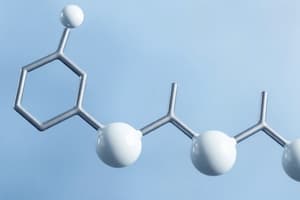Podcast
Questions and Answers
What is the characteristic feature of organic compounds?
What is the characteristic feature of organic compounds?
- They contain carbon (correct)
- They contain hydrogen
- They contain oxygen
- They contain nitrogen
What type of bonds can carbon atoms form with atoms of other elements?
What type of bonds can carbon atoms form with atoms of other elements?
- Only double covalent bonds
- Only single covalent bonds
- Single, double, and triple covalent bonds (correct)
- Only triple covalent bonds
What is the term for the mixing or overlapping of atomic orbitals to produce hybrid orbitals?
What is the term for the mixing or overlapping of atomic orbitals to produce hybrid orbitals?
- Bonding
- Atomization
- Hybridization (correct)
- Molecularization
What is the unique feature of carbon that allows it to form molecules of widely different sizes, shapes, and compositions?
What is the unique feature of carbon that allows it to form molecules of widely different sizes, shapes, and compositions?
What is the definition of organic chemistry?
What is the definition of organic chemistry?
What type of structures can carbon atoms form with themselves?
What type of structures can carbon atoms form with themselves?
What is the bond angle between sp3 hybrid orbitals?
What is the bond angle between sp3 hybrid orbitals?
What is the type of bond formed by the head-to-head overlap of atomic orbitals?
What is the type of bond formed by the head-to-head overlap of atomic orbitals?
What is the s character in sp3 hybridization?
What is the s character in sp3 hybridization?
What is the type of hybridization in which the s orbital can hybridize with only two p orbitals?
What is the type of hybridization in which the s orbital can hybridize with only two p orbitals?
What is the type of bond that is formed by the side-to-side overlap of unhybridized p orbitals?
What is the type of bond that is formed by the side-to-side overlap of unhybridized p orbitals?
What is the reason for restricted rotation about doubly bonded carbons?
What is the reason for restricted rotation about doubly bonded carbons?
Flashcards are hidden until you start studying




